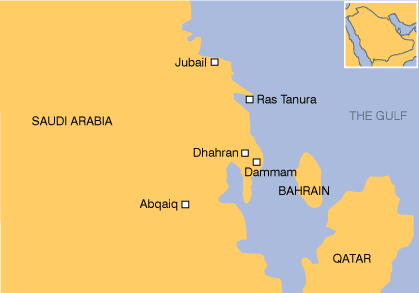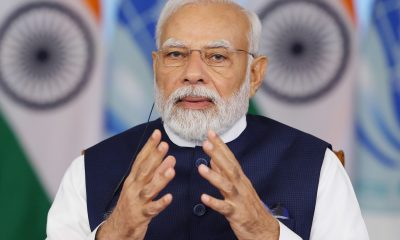News
Journalists see heart of Saudi oil industry after attack

The journalists arrived at Saudi Arabia’s Abqaiq oil processing facility, described by the state-run oil giant Saudi Aramco as “the largest crude oil stabilization plant in the world.” (File Photo By Gordeonbleu at English Wikipedia – Transferred from en.wikipedia to Commons., Public Domain)
BUQAYQ, Saudi Arabia — Saudi Arabia took journalists on Friday to the site of a missile-and-drone strike on the kingdom’s oil industry that shook global energy markets over the weekend, while Kuwait raised the security levels at its ports following the attack that the U.S. alleges Iran carried out.
The journalists arrived at Saudi Arabia’s Abqaiq oil processing facility, described by the state-run oil giant Saudi Aramco as “the largest crude oil stabilization plant in the world.” Video shot of the Sept. 14 attack showed flames leaping into the air just before dawn, with thick black smoke rising from the site visible from space.
Iran denies being involved in the attack and its foreign minister warns any retaliatory strike on it by the U.S. or Saudi Arabia will result in “an all-out war.” The spike in regional tensions comes as Iran’s 2015 nuclear deal with world powers unravels, following President Donald Trump’s unilateral withdrawal of the U.S. from the accord over a year ago.
Yemen’s Iranian-allied Houthi rebels claimed the assault, but analysts say the missiles used wouldn’t have enough range to reach the site from Yemen. The missiles and drones used also resemble Iranian-made weapons, though analysts say more study is needed to definitively link them to Iran.
A Saudi-led coalition has battled the Houthis since March 2015 in a bloody and stalemated war.
Kuwait’s state-run KUNA news agency published the port decision Friday, quoting Kuwait’s minister of commerce and industry as making the announcement. Khaled al-Roudhan said the decision affected both commercial ports and oil facilities.
Saudi Arabia also flew journalists to its Khurais oil field Friday to see the damage from the attack. The oil field is believed to produce over 1 million barrels of crude oil a day. It has estimated reserves of over 20 billion barrels of oil, according to Aramco.
Officials said 110 contractors evacuated the site after the attack, but there were no injuries. They told journalists the oil field was back online within 24 hours of the attack.
An oil stabilization tower could be seen to be damaged by the attack, standing charred in the heat of Friday afternoon in the Saudi desert. Other pipes bore holes from damage in the attack.
The Abqaiq facility processes sour crude oil into sweet crude, then transports it onto transshipment points on the Persian Gulf and the Red Sea or to refineries for local production. Estimates suggest it can process up to 7 million barrels of crude oil a day. By comparison, Saudi Arabia produced 9.65 million barrels of crude oil a day in July.
The plant has been targeted in the past by militants. Al-Qaida-claimed suicide bombers tried but failed to attack the oil complex in February 2006.
———
Gambrell reported from Dubai, United Arab Emirates.





















